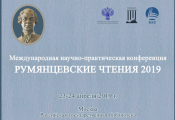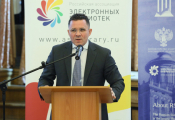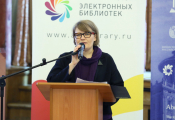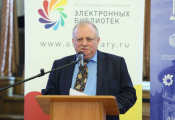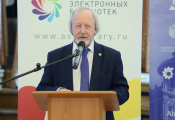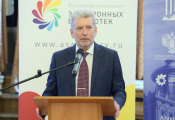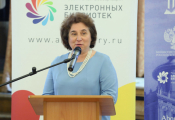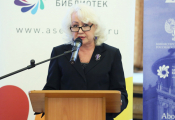“Rumiantsev Readings 2019”
30.04.2019
23 – 24 April, 2019, the Russian State Library hosted the annual international research and practical conference “Rumiantsevsky Chteniya 2019” (“Rumiantsev Readings 2019”).
The event was organized by the Ministry of Culture of the Russian Federation, the Russian State Library and the Library Assembly of Eurasia.
Among the themes offered for speeches and discussions there could be named the following ones:
- Libraries and museums within the historical context;
- History of the Russian State Library;
- Disclosing universal and specialized library collections – forms and methods;
- Future of libraries – evaluation, research and prognoses;
- Libraries as centres of information and bibliography;
- Library collections and information services in the age of digital communication;
- Professional development of library staff – demands of the time. Library as an educational centre;
- International library cooperation. Library as a platform for inter-culture dialogue.
With years, the conference would acquire more and more diverse participants. Thus, the conference of 2019 met over 540 specialists from Russia, Belarus, Ukraine, Lithuania, Kazakhstan, Tajikistan, the USA and Australia. They were representatives of national, federal and municipal libraries, of museums and archives, of research institutes, higher education establishments, etc.
The online broadcast of the events of the “Rumiantsevsky Chteniya” on the official website of the Russian Association of Digital Libraries www.aselibrary.ru connected over 270 more participants – those who could not attend the conference in person.
The conference was started by the director general of the RSL Vadim V. Duda. The speaker pointed out at the increasing interest of the society towards professional events of the library sphere. In April 2019 the RSL had hosted research and practical seminar “Document restoration – conservatism and innovations” and “The Gutenberg Bible – beginning of the new epoch”. It also participated in “Library Night 2019” – and all those events got a considerable piece of mass media coverage. That proved the interest of the public. Another fact witnessing libraries becoming more and more popular was the growth of their audiences. The readers would get more and more active. Intellect and personal development would return its popularity among the young. The director general of the RSL concluded his speech by wishing good luck to the conference participants.
The opening ceremony was continued by Natalya V. Yaitsova, deputy head of the Library division of the Department of Information and Digital Development of the Ministry of Culture of the Russian Federation. She read out the greeting letter from deputy minister of culture Olga S. Yarilova. The latter pointed out that the themes touched upon during “Rumiantsev Readings” were broad and covered numerous matters of library science and of history, as well as of the contemporary state of affairs of the establishments of culture and science. Ms Yarilova expressed her hope for the conference to be fruitful and positive, to support international cooperation and for its results to be practically important. Olga Sergeyevna wished everyone to enjoy communication and to work efficiently.
The positive atmosphere was taken to the working part of the conference as well. The plenary meeting was started by Yakov L. Shraiberg, doctor of technology, professor, the director general of the Russian National Public Library for Science and Technology, president of national library association “Libraries of the Future”, corresponding member of the Russian Academy of Sciences. His speech was entitled “Main trends of the development of the world library and information infrastructure”. The speaker depicted certain trends which had been formed in library business several years before. The considerable part of those trends would develop actively. Alongside there were constantly be formed new trends. Among the main ones Mr Shraiberg named efficient cooperation of printed and digital book, journal and publication; world progress towards open access which was not always free; changes in Copyright legislation needed and awaited by authors and by readers as well. Still, speaking about the trends to be ever continued, Yakov Leonidovich mentioned intense development of digital technologies, digitalization and digital libraries. He would also marked the ‘big data’ concept and the modern stage of computer revolution to deserve the audience’s concern. The speech was concluded by the statement that contemporary libraries were not only significant sources of forming information sets or knowledge infrastructure. They were also to be acknowledged leisure and educational centres.
The speech to come was devoted to library history. Speaking about “Library and challenges of the time – historical aspect”, Mikhail D. Afanasiyev, candidate of History, the director of the State Historical Public Library, president of the Russian Library Association, reported to the audience main historical perspectives of library development, beginning with the pre-printing era and finishing with contemporary libraries and their features. Mr Afanasiyev characterized main functions of libraries at each of the stages of their development. As it turned out, libraries would tend to get into critical situations from time to time. It would be provoked by global civilization changes, as well as by less important political and social shifts. Library would function and it would depend on the society, so each time the crisis came library would also be put into the situation of choice. Mikhail Dmitriyevich terminated his speech by offering possible prospects for library development.
Alexander I. Visly, candidate of Physics and Mathematics, deputy director of the RSL, reported on “Scientific journals of the Russian Academy of Sciences. Thorny path from editor to reader”. To begin with, Mr Visly reminded the audience that 1st January 2017, there had come into force amendments to Federal Law ”About legal deposit copies”. From that time on, document producers had to present to the RSL not only legal deposits in the printed form, but electronic copies as well, which had to be completely identical, within seven days from the moment of work being published. Not all document producers obeyed. The situation seemed even worse with the electronic copies of the scientific journals published under the aegis of the Russian Academy of Sciences – from 197 journals only 14 transferred their copies to the RSL. Still the journals possessed considerable scientific value. Approximately 80% of their articles were quoted all over the world!
In its essence library was a certain mediator between book/journal and reader, and the possibility of providing access to the latest scientific achievements could be called most important for it. In conclusion Mr Visly pointed out that due to amendments to the Civil Code of the Russian Federation (paragraph 5 of clause 1275) and to Federal Law “About legal deposit copies”, the RSL had to acquire an open database of scientific journals, though the way towards that was awaited to be long and thorny.
The new format of studying and disclosing specialized collections of the RSL was reported by Natalia Yu. Samoylenko, candidate of Art History, RSL director in international and exhibition affairs. In her speech “New format of studying and disclosing specialized collections of the RSL – exhibition projects of the Ivanovsky Room”, Ms Samoylenko pointed out that the exhibition activities of the RSL were closely connected with its specialized collections, such as the collections of the Manuscript Department, the collections of the Rare Book Department, the collections of the Centre of Eastern Literature, the collections of the Department of Artworks and the collections of the Cartography Department. The new exhibition space of the RSL (the Ivanovsky Room), which had been opened in December 2016, could already boast of 6 exhibitions held at the museum level. They were “Book as viewed by designers”, “Moscow 1917. Perspective from the Vagankovsky Hill”, “Maps of the lands of the Russian North – myths and reality”, “Alexander 2: Upbringing and enlightenment”, “Books of the old home – the world of child book of the 19-beg.20 centuries” and “The Gutenberg Bible – beginning of the new epoch”. The Ivanovsky Room enabled the materials of the RSL collections to be shown at a higher level which attracted the attention not only of the professionals, but of considerably wider circles of public. The exhibitions prepared used real exhibits (that including those ones provided by partners) together with multimedia means, while application for mobile devices Artefact with the technology of augmented reality enabled visitors of the exhibition to view more details of the materials presented.
To prolong the life of the exhibitions, there had been launched project “Virtual exhibitions of the Russian State Library” http://presentation.rsl.ru. The portal contained the materials of the presentations and archives of the RSL exhibitions, that including those ones completed by the materials which had not entered the main exposition.
Ms Samoylenko concluded her speech by inviting all the participants of the international research and practical conference “Rumiantsevsky Chteniya 2019” to attend one of the exhibitions which was held at the Ivanovsky Room at that moment “The Gutenberg Bible – beginning of the new epoch” (the exhibition was opened till 16 June, 2019). For the conference participants the exhibition was free.
Ekaterina L. Kudrina, doctor of pedagogy, professor, the honoured worker of culture of the Russian Federation, head of centre “Corporate University Leninka” of the Russian State Library, was the following person to speak on different aspects of library activities. Her report was entitled “Information and education space of the RSL within the conditions of digitalization of culture”, and it was devoted mainly to the educational direction of work of libraries in general, and of the RSL in particular. Ms Kudrina underlined that significant and system changes could be viewed for the moment of speaking, and all those changes were connected with or generated by digitalization of culture and re-evaluation of the model of interrelations of the contemporary culture and society. Digitalization of the sphere of culture would change metrics. Library services would become services of the digital environment. Still the very way of library work tended to change: libraries were turning into service providers. More and more often “book delivery” would mean “digital book delivery”, readers would become remote and when dealing with statistics, web statistics was coming into the first plan. All those phenomena revealed the necessity of changing approaches towards library and its work, as well as towards competence of its staff. Libraries had to become centres of personal development, centres of success and intellectual centres.
The speech being over, the international research and practical conference “Rumiantsevsky Chteniya 2019” was continued in the form of section meetings, roundtable discussions and seminars.
All in all the conference 2019 held 15 sections and roundtable discussions devoted to the following themes:
- “Artistic editions in library and museum collections – problems of studying, preservation and popularization”;
- “Library classification systems”;
- “New national standard in bibliography description. GOST R 7.0.100—2018 in the modern information environment”;
- “N.М.Sikorsky – researcher, organizer of book-studying science and of library business. To the 100th anniversary”;
- “Rare books and books of value, separate books and book collections. Book studying and bibliography research”;
- “Manuscript sources in library collections”;
- “Specialized library collections”;
- “Collectors, researchers and guardians. Libraries and museums in the historical context”;
- “The ongoing education as a competence resource of library staff”;
- “Theory and practice of library business development at the present stage”;
- “Library digitalization – trends, problems and prospects”;
- “Library terminology in the context of digital milieu”;
- “Cooperation of libraries of the CIS states – direction strategies”;
- “Flagship projects shaping the future of libraries”.
Then, there took place pre-session meeting of the 32nd RBA section in library management and marketing “Efficient library management – problems and solutions”.
The programme of the “Rumiantsev Readings 2019” turned out to be rich in events. 178 speeches were presented, the bulk of which could be accessed in the collection of materials issued for the start of the conference.
The Russian Association of Digital Libraries broadcasted the following events of the “Rumiantsev Readings 2019”:
- Opening ceremony and plenary meeting;
- Section “Art editions in library and museum collections – problems of studying, preservation and popularization”;
- Roundtable “Flagship projects shaping the future of libraries”.
You are welcome to view video materials of the conference events on the official website of the Russian Association of Digital Libraries in section “Videos of events” over here http://www.aselibrary.ru/video/conference43/conference438675/.


 Virtual Keyboard
Virtual Keyboard
 по-русски
по-русски

